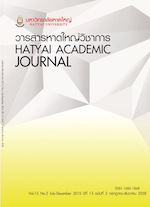แนวทางการพัฒนาภาวะผู้นำเชิงจริยธรรมของคณาจารย์ มหาวิทยาลัยในภาคใต้ตอนล่าง
Main Article Content
Abstract
1. องค์ประกอบภาวะผู้นำเชิงจริยธรรมของคณาจารย์ มหาวิทยาลัยในภาคใต้ตอนล่าง ประกอบด้วย 5 องค์ประกอบ โดยเรียงลำดับความสำคัญ ดังนี้ 1) องค์ประกอบด้านการดูแล 2) องค์ประกอบด้านความเป็นพลเมือง ดี 3) องค์ประกอบด้านสัมพันธภาพ 4) องค์ประกอบด้านความเป็นมืออาชีพ และ 5) องค์ประกอบด้านความมี เหตุผลเชิงจริยธรรม
2. แนวทางการพัฒนาภาวะผู้นำเชิงจริยธรรมของคณาจารย์ มหาวิทยาลัยในภาคใต้ตอนล่าง ไปสู่การ ปฏิบัติมี 3 แนวทาง ได้แก่ 1) การเสริมสร้างการมีส่วนร่วมในรูปแบบภาคีเครือข่ายการพัฒนาจริยธรรม 2) การ ปรับปรุงหลักสูตรด้านจริยธรรม โดยการบูรณาการเนื้อหาด้านจริยธรรมในหลักสูตร ให้มีความต่อเนื่อง ตั้งแต่ ระดับประถมศึกษาจนถึงระดับอุดมศึกษา โดยเน้นจริยธรรมด้านการเรียนการสอน จริยธรรมในการวิจัย ตลอดจนจริยธรรมในการจัดโครงการเพื่อพัฒนาคณาจารย์ 3) การรณรงค์ให้ทุกคนเข้ามามีส่วนร่วมในทุกขั้นตอน ของการพัฒนาจริยธรรมอย่างเป็นระบบ
The Development Guidelines of Ethical Leadership of University Lecturers in the Lower Southern Thailand
The objectives of this research were to (1) develop the indicators of ethical leadership of university lecturers in the lower southern Thailand and (2) to suggest the guidelines as a policy for developing ethical leadership of university lecturers in the lower southern Thailand into practice. A set of 70 questions was used. The sample was 1,000 lecturers from six universities in the lower southern Thailand. Both the Exploratory Factor Analysis and Confirmatory Factor Analysis were employed to analyze the data. The research findings were as follow:
1. Five factors of ethical leadership were found and shown in descending order as the Ethics of Care, the Ethics of Good Citizenship, the Ethics of Relationship, the Ethics of the Profession and the Ethics of Critique.
2. Three developmental guidelines for the implication of the ethical leadership for lecturers in Southern Thailand were 1) strengthening the participation in a partnership networks for ethical development, 2) improving the curriculum in ethical leadership by integrating ethics into the present curriculum to have continuity from primary to higher education, with an emphasis on ethical education, research and staff development, and 3) campaigning for participation of staff members to participate in every step of the ethical development.
Article Details
All published articles are evaluated by three qualified peer reviewers from various institutions through a double-blind process, where reviewers do not know the authors’ identities and authors do not know the reviewers’ identities. The content and articles in the Hatyai Academic Journal reflect the authors’ views only and are neither the opinions of the editorial board nor the responsibility of Hatyai University. The Editorial Board of the Hatyai Academic Journal allows articles to be reproduced for academic purposes, on the condition that the original source is clearly cited.


